What Inspired Orson Scott Card to Write Ender’s Game?
Guest blogger Dr. Lee Carroll (AKA EL Whitehorse)
Introduction
This is the first article in a series about the inspiration for classic science fiction novels and author characteristics that spur them on to create such masterpieces as Ender’s Game (Orson Scott Card), Dune (Frank Herbert), Stranger in a Strange Land (Robert A. Heinlein), The Foundation Series (Isaac Asimov), and Battlefield Earth (L. Ron Hubbard).
These authors and titles are based on a 2021 national survey of Battlefield Earth readers to find out which author/novel mostly compares to Battlefield Earth. Following are some of the results:
- 34% compared Battlefield Earth to Asimov/The Foundation Trilogy
- 30% compared Battlefield Earth to Frank Herbert/Dune
- 19% compared Battlefield Earth to Orson Scott Card/Ender’s Game
- 15% compared Battlefield Earth to Robert Heinlein’s works of science fiction
Also interesting is that 20% of those surveyed stated that Battlefield Earth is to science fiction as Lord of the Rings is to fantasy.
We will begin the series with Orson Scott Card’s inspiration for the Hugo and Nebula Award-winning novel Ender’s Game. This book about kids training for interstellar war has impacted generations of readers and left an indelible mark on the science fiction genre.
Early Influences and Inspiration
Nurtured during his upbringing in the 1950s and ’60s, Card’s fascination with military history and sci-fi shaped Ender’s Game. As a teenager, he pondered the challenge of training soldiers for zero-g combat in space, a seed of inspiration that germinated over a decade. How would you train soldiers to fight in space where up and down lose meaning?
Faith and underdog determination influenced Card, too, as a devout Mormon who admired biblical unexpected winners. Then reading and studying from Tolkien to Asimov, he began to craft intricately woven fictional worlds with big ideas. Little did he know this eclectic mix would someday catalyze his most iconic work.
Ender’s Game follows recruits to Battle School orbiting Earth, commanding ships to defend humanity from alien “Buggers.”
The novel provokes debate through empathy for characters facing complex choices. “I wanted to explore moral issues surrounding justified violence … and the relationships between emotional justifications for atrocity,” Card explained.
From Short Story to Novel to Franchise
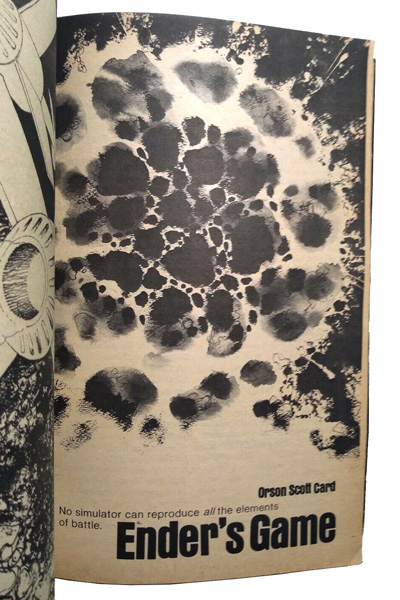 First published as a short story in Analog magazine in 1977, Scott Card secured a book deal with a daring new startup, Tor Publishing, in the early ’80s.
First published as a short story in Analog magazine in 1977, Scott Card secured a book deal with a daring new startup, Tor Publishing, in the early ’80s.
Having gained some acclaim from his short story, Card felt there was vastly more potential to explore in Ender Wiggin’s tale. Rather than a sequel, his instincts pushed him toward fleshing out that first saga.
He spent weeks writing isolated except for the sporadic interruption of his six-year-old son. Inspiration struck his marathon writing sessions with such force that he often disappeared till dawn for days, immersed in Ender’s world.
Card set out to probe the moral gray zones around warfare’s dilemmas like survival-driven violence. Rather than alleviating readers with easy answers, he embraced moral complexity through Ender’s painful choices.
While some critics blasted the novel for the unflinching depiction of children employed as weapons, Card earned acclaim for originality in confronting darker aspects of human nature. The book earned a Hugo and a Nebula Award.
In the end, Ender’s Game launched a franchise spanning over a dozen books and games.
Characteristics of Great Exceptional Writers
What makes an author not just a great author but an exceptional author who can conceive of and write an epic and timeless novel of such global impact?
“The 6 Characteristics Every Great Writer Has in Common” are:
- Attention to Detail
- Discipline
- Clarity
- Strong Vocabulary
- Open to Changes
- Passion for Reading
Orson Scott Card has every one of these characteristics. However, there are two more characteristics to describe him and the other exceptional writers in this series of articles:
- Paying it Forward
“Paying it Forward” is an expression of responding to a person’s kindness by being kind to someone else rather than paying it back to the original benefactor. Robert A. Heinlein popularized the term in his Between Planets 1951 novel.
As for Orson Scott Card, he is a consummate writer and teacher. He is the ultimate practitioner of showing kindness toward the next generation of writers and sharing what he knows about the craft.
He has taught professional writing workshops at Pepperdine University, Utah Valley State University, the University of North Carolina, and South Virginia University.
Since 1994, he has served as a judge for the L. Ron Hubbard Writers of the Future Contest, teaching at the annual workshops, including the very first official workshop in Sag Harbor in 1987.
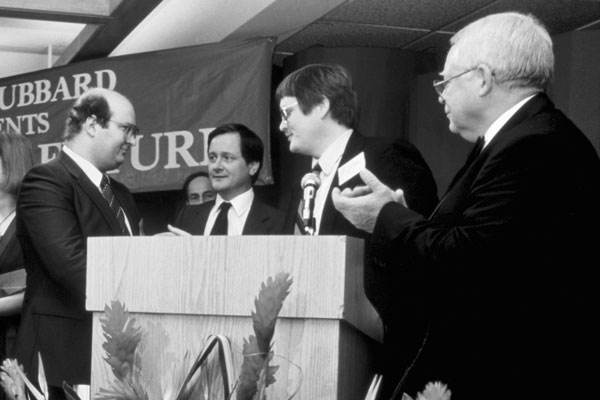
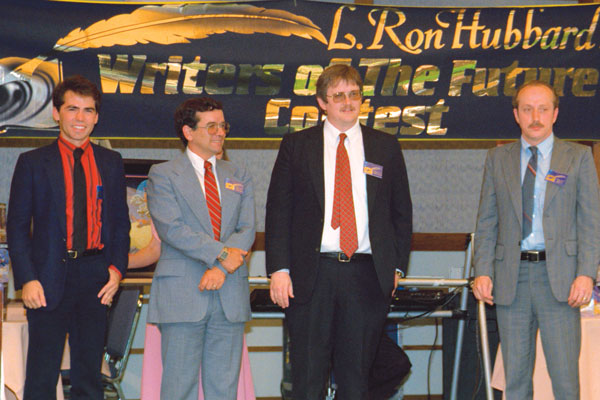
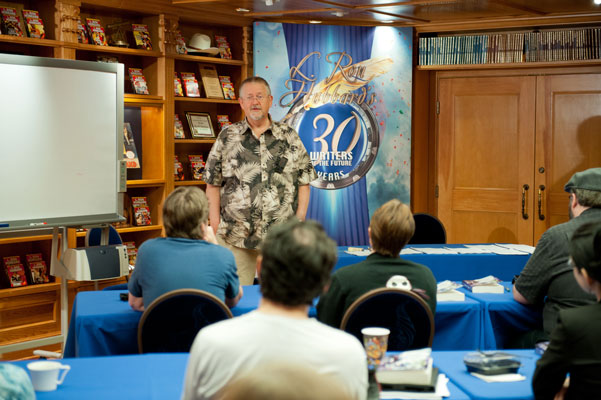
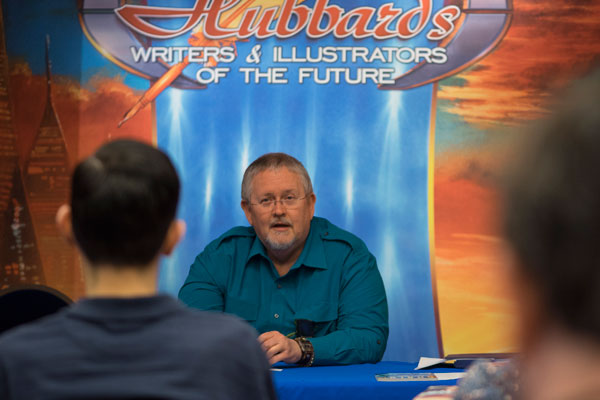
Since 2001, he has run an annual “literary boot camp,” an intensive critique workshop for aspiring writers; he has also published two books on the writing field.
Scott Card received the L. Ron Hubbard Lifetime Achievement Award in 2014 for his outstanding contributions to the arts. To this day, he routinely appears in Writers of the Future online workshops, freely sharing his lifetime of experience and advice on writing.
- Compassion
Compassion is not synonymous with “Paying it Forward,” but they are related. Compassion is defined as a feeling that motivates individuals to go out of their way to relieve physical, spiritual, or emotional pains of others and themselves. It is sensitivity to the emotional aspects of the suffering of others. In most extraordinary works of science fiction with remarkable emotional impact, the authors have compassion not just for humankind but for all good-natured forms of life. A characteristic that goes beyond mere writing and Earth existence.
Concluding Thoughts
Why does Ender’s Game continue to captivate readers 35+ years later?
Possibly because:
- It explores morality and the loss of innocence through children coming of age.
- It manifests isolation and faith through a sci-fi lens reflecting on human nature’s darker parts potentially lurking within anyone.
- It rivaled forebears like Asimov in imagination and has boldly reshaped modern science fiction―a testament to the author’s singular storytelling.
It’s a stellar legacy for what began as a teen pondering training soldiers for zero-g combat. Like Ender himself, this story beat the odds in touching people’s lives across decades and across the globe. The creative seeds Orson Scott Card planted with this one story will continue to enrich the galaxies.
 Dr. Lee Carroll (AKA EL Whitehorse)
Dr. Lee Carroll (AKA EL Whitehorse)
Working abroad in 10 countries of Europe, Asia, Africa, North and South America, both as a doctor and teacher, has shown me life through a prism of viewpoints. That experience has enriched my writing to the point where I enjoy showcasing the admiration I feel for varied cultures.
For example, my WOTF Semi-finalist entry is published for Kindle as Death Clearinghouse: The Novelette, featuring Apache ingenuity.
When I’m not writing, I’m yanking swords out of stones around the world.
(Amazon author page: https://www.amazon.com/stores/author/B07TRC1F4V/about)
References
Ender Wiggin and Jonnie Goodboy Tyler Take the Hero’s Journey
Dune and Battlefield Earth—Futuristic Technology: Sci-Fi Classics Set the Pace for Tech Innovations
Dune and Battlefield Earth—Heroes: The Force That Drives Sci-Fi
Science Fiction Classic Books, Foundation and Battlefield Earth
Videos:
Interview with Orson Scott Card
Ender’s Game (2013) Official Trailer – Harrison Ford, Asa Butterfield
Orson Scott Card talks Ender’s Game on Deseret News Sunday Edition
Articles:
Critics, community, and Ender’s Game: An interview with Orson Scott Card


Leave a Reply
Want to join the discussion?Feel free to contribute!